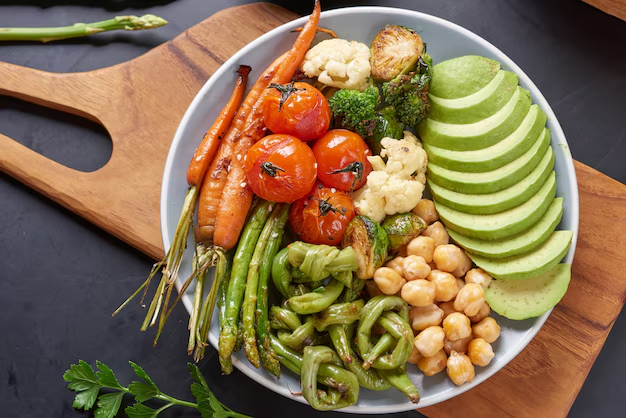A vegan diet can help you in many ways. It can make you lose weight. It could also lower your chance of getting diabetes. Plus, it might make your kidneys work better and your blood sugar drop. Eating Vegan brings a wide array of health boons.
If you’re aiming to shed extra pounds, a vegan diet is a good choice. It also supports a healthy heart. And it might defend you against type 2 diabetes and some cancers.
Key Takeaways
- A vegan diet can provide numerous health benefits, including weight loss, improved heart health, and reduced chronic diseases risk.
- Vegan diets are usually richer in fiber, antioxidants, and helpful plant substances than a standard Western diet.
- Vegan eating might even reverse type 2 diabetes. It does this by bettering blood sugar and kidney function.
- Vegan foods like fruits, veggies, and whole grains could guard against some cancers.
- To get all necessary nutrients on a vegan diet, one must plan carefully. This includes protein, vitamins B12 and D, and key fatty acids.
Introduction to Vegan Diets
A vegan diet is based on plants and doesn’t include animal products such as meat, dairy, eggs, and honey. It brings along many health benefits. But, there’s a difference between a whole food vegan diet and a poorly planned vegan diet.
Whole Food Vegan Diet vs Poorly Planned Vegan Diet
A whole food vegan diet chooses nutrient-rich plant-based foods. It includes fruits, vegetables, whole grains, legumes, nuts, and seeds. This diet offers more vitamins, minerals, fiber, and antioxidants. But, eating only processed vegan foods could mean missing key nutrients and facing deficiencies.
Benefits of Plant-Based Whole Foods
Moving to a whole food vegan diet means you get more nutrients like fiber, antioxidants, and plant compounds. These foods have lots of benefits for your health. They can help your heart health, improve blood sugar, and may reduce the chance of getting some cancers.
Vegan Diet for Weight Loss

Many studies show that, on average, vegans are thinner. They have a lower body mass index than non-vegans. The reason for this is clear. Vegan diets are often rich in fiber, fruits, vegetables, and whole grains. These foods help you feel full and manage your weight well kale.
Randomized Controlled Trials on Vegan Diets for Weight Loss
Well-designed studies back these claims up. They show that vegan diets are better for weight loss. This means choosing a vegan diet could be smart if you’re aiming to shed some pounds. It works for both those already vegan and those just starting.
The big picture is this: a thoughtfully crafted plant-based vegan diet helps with losing and managing weight. By choosing healthy, nutrient-packed foods, vegans can hit their weight loss targets in a safe, steady way.
Better Blood Sugar Control and Kidney Function
A vegan diet is great for people with type 2 diabetes and those worried about their kidney health. It has been proven that going plant-based can lead to better blood sugar levels. It even lowers the risk of getting type 2 diabetes.
Impact on Type 2 Diabetes Risk
Vegans usually have lower blood sugar levels and better insulin sensitivity than non-vegans. For people with or at risk of type 2 diabetes, this news is great. A vegan diet full of fruits, vegetables, whole grains, legumes, nuts, and seeds. Such meals can keep blood sugar levels in check and lower the risk of type 2 diabetes.
Improving Kidney Function in Diabetics
On top of that, a vegan diet is also good for your kidneys. Especially for people with diabetes. By eating fewer animal-based proteins and more plant-based proteins, you can help your kidneys. This leads to better kidney function. It can also slow down the kidney disease process in those with type 2 diabetes.
Reducing Diabetes Medication Dosage
Studies show that a vegan diet can lower the amount of diabetes medications you need. If you manage your blood sugar levels with a plant-based diet, it can really help. Some people have even stopped taking certain diabetes medications with their doctor’s approval.
Vegan Food and Cancer Prevention
Studies show vegan diets may help prevent certain cancers. These include prostate cancer, breast cancer, and colorectal cancer. Vegan diets are rich in plant-based foods. They include antioxidants, fiber, and phytochemicals that benefit health.
Plant Foods and Lower Cancer Risk
Vegans eat a lot more legumes, fruits, and vegetables than others. These foods provide numerous nutrients and compounds that fight cancer. In 2017, a study showed vegans had a 15% lower cancer risk than non-vegans.
Avoiding Processed and Red Meats
Choosing a plant-based diet means not eating processed meats and red meats. These meats can raise cancer risk, especially colorectal cancer. By skipping these foods, vegans could further lower their cancer risk.
Heart Health Benefits of Vegan Food
Going vegan can greatly boost your heart health. Studies show that vegan diets lead to lower heart disease risks, better cholesterol, and reduced blood pressure.
Lower Blood Pressure and Cholesterol Levels
Vegan food helps your heart by reducing blood pressure and bad cholesterol. This comes from eating lots of plant-based foods like fruits, veggies, whole grains, legumes, nuts, and seeds. These foods are low in bad fats and high in fiber, antioxidants, and plant chemicals. They’re well known for improving blood pressure and cholesterol, key for a healthy heart and lower heart disease risk.
Whole Grains and Nuts for Heart Health
There are special plant-based foods that are extra good for your heart. Whole grains and nuts, for instance, are rich in fiber and good fats. They also have nutrients that protect your heart. Adding these vegan-friendly foods to your diet can boost your heart health.
Vegan Diets for Arthritis Relief
Many studies show a vegan diet is good for several types of arthritis. In one study, some people with arthritis kept their usual diet. Others changed to a vegan diet. Those on the vegan diet saw big improvements in pain, stiffness, and how well they could move.
Plant-based foods like fruits, veggies, whole grains, and legumes are full of goodness. They have antioxidants and fiber that fight off inflammation and stress. Lowering these can really help with arthritis.
By staying on a healthy vegan diet, people can lose extra weight. This weight loss is good for arthritis because it takes stress off the joints. Many arthritis patients say they feel better and use less anti-inflammatory medications with this diet.
Increased Nutrient Intake on a Vegan Diet

Changing to a whole food vegan diet increases your intake of important nutrients, vitamins, and minerals. Fiber, antioxidants, and plant compounds are more in a vegan diet than a typical Western one.
Higher Fiber, Antioxidants, and Beneficial Plant Compounds
A vegan diet focuses on fruits, vegetables, whole grains, legumes, nuts, and seeds. These foods are rich in fiber, antioxidants, and various plant compounds. They help keep you healthy and might lower the risk of certain diseases.
Ensuring Adequate Nutrient Intake
Planning a good vegan diet can give you plenty of essential nutrients. But, you have to be extra careful with some vitamins and minerals like vitamin B12, vitamin D, and omega-3 fatty acids. Using fortified foods, supplements, or algae-based sources helps vegans get these important nutrients.
Vegan Food

Most protein comes from animal products. But, vegans have plenty of plant-based protein sources too. They can get protein from things like soy (tofu, tempeh, edamame), seitan, legumes, nuts, and seeds. These vegan options have all the amino acids needed for muscles.
Getting Vitamins B12 and D on a Vegan Diet
Vegans must pay special attention to vitamins B12 and D. These vitamins mainly come from animal products. Luckily, vegan-friendly sources exist too. They can find these vitamins in fortified plant-based milks and cereals. Supplements also offer a solution. With a bit of planning, vegans can get all the vitamins they need.
Essential Fatty Acids and Iron Sources
Omega-3 fatty acids are crucial for vegans. They are in foods like flaxseeds, walnuts, and algae. Iron is another key nutrient. Vegans can find it in lentils, quinoa, tofu, and leafy greens. Eating a mix of these nutrient-dense vegan foods helps vegans get the minerals they need.
Also Read: Exploring The Rich Flavors Of South African Bobotie: A Culinary Heritage
Conclusion
In conclusion, eating more vegan and plant-based foods is good for you. It helps with losing weight and lowers the chance of getting sick. A vegan diet is key to feeling your best.
If you want to try new vegan recipes or vegan meal choices, there are lots of tasty options. You can enjoy meals like black bean bowls and quinoa with cauliflower. The world of vegan food is full of flavor.
There are many vegan-friendly ingredients, such as tofu and tempeh. Also, avocado and nutritional yeast are great for cooking. Trying vegan food is a tasty way to stay healthy. If you’re new to vegan eating or already into it, you have plenty to explore.
FAQs
Q: What are the health benefits of vegan food?
A: Vegan food offers numerous health benefits such as lower risk of heart disease, diabetes, and certain types of cancer. It is also rich in fiber, vitamins, and minerals.
Q: How can tofu be incorporated into a vegan diet?
A: Tofu is a versatile ingredient that can be used in stir-fries, soups, salads, and even desserts. It is a great source of plant-based protein for vegans.
Q: What are some easy vegan recipes using cauliflower?
A: Cauliflower can be used to make delicious dishes like cauliflower rice, cauliflower buffalo wings, and cauliflower crust pizza. It is a versatile and nutritious vegetable for vegans.
Q: Are there vegan options for classic dishes like bolognese?
A: Yes, you can make a vegan-friendly bolognese using ingredients like lentils, mushrooms, and tomatoes as substitutes for meat. It is a delicious and cruelty-free version of the traditional dish.
Q: How can quinoa be used in vegan cooking?
A: Quinoa is a nutritious grain that can be used in salads, soups, bowls, and even desserts. It is a great source of protein and gluten-free, making it a popular choice among vegans.
Q: What are some delicious vegan cheese alternatives?
A: There are various vegan cheese options made from nuts, soy, or coconut that are available in stores. They can be used in sandwiches, salads, and pasta dishes as a dairy-free alternative.
Q: How can vegans ensure they get enough protein in their diet?
A: Vegans can get protein from sources like beans, lentils, tofu, tempeh, and chickpeas. Including a variety of plant-based protein sources in meals can help meet daily protein requirements.



